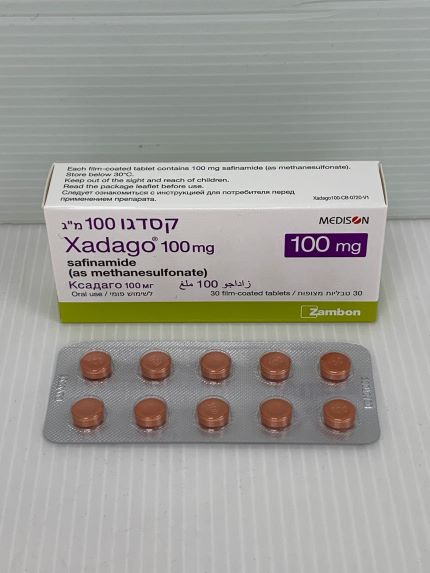Quest for the right Drug

קסדגו 100 מ"ג XADAGO 100 MG (SAFINAMIDE AS METHANESULFONATE)
תרופה במרשם
תרופה בסל
נרקוטיקה
ציטוטוקסיקה
צורת מתן:
פומי : PER OS
צורת מינון:
טבליות מצופות פילם : FILM COATED TABLETS
עלון לרופא
מינוניםPosology התוויות
Indications תופעות לוואי
Adverse reactions התוויות נגד
Contraindications אינטראקציות
Interactions מינון יתר
Overdose הריון/הנקה
Pregnancy & Lactation אוכלוסיות מיוחדות
Special populations תכונות פרמקולוגיות
Pharmacological properties מידע רוקחי
Pharmaceutical particulars אזהרת שימוש
Special Warning עלון לרופא
Physicians Leaflet
Interactions : אינטראקציות
4.5 Interaction with other medicinal products and other forms of interaction In vivo and in vitro pharmacodynamic drug interactions MAO inhibitors and pethidine Xadago must not be administered along with other MAO inhibitors (including moclobemide) as there may be a risk of non-selective MAO inhibition that may lead to a hypertensive crisis (see section 4.3). Serious adverse reactions have been reported with the concomitant use of pethidine and MAO inhibitors. As this may be a class-effect, the concomitant administration of Xadago and pethidine is contraindicated (see section 4.3). There have been reports of medicinal product interactions with the concomitant use of MAO inhibitors and sympathomimetic medicinal products. In view of the MAO inhibitory activity of safinamide, concomitant administration of Xadago and sympathomimetics, such as those present in nasal and oral decongestants or cold medicinal products containing ephedrine or pseudoephedrine, requires caution (see section 4.4). Dextromethorphan There have been reports of medicinal product interactions with the concomitant use of dextromethorphan and non-selective MAO inhibitors. In view of the MAO inhibitory activity of safinamide, the concomitant administration of Xadago and dextromethorphan is not recommended, or if concomitant treatment is necessary, it should be used with caution (see section 4.4). Antidepressants The concomitant use of Xadago and fluoxetine or fluvoxamine should be avoided (see section 4.4), this precaution is based on the occurrence of serious adverse reactions (e.g. serotonin syndrome), although rare, that have occurred when SSRIs and dextromethorphan have been used with MAO inhibitors. If necessary, the concomitant use of these medicinal products should be at the lowest effective dose. A washout period corresponding to 5 half-lives of the SSRI used previously should be considered prior to initiating treatment with Xadago. Serious adverse reactions have been reported with the concomitant use of selective serotonin reuptake inhibitors (SSRIs), serotonin norepinephrine reuptake inhibitors (SNRIs), tricyclic/tetracyclic antidepressants and MAO inhibitors (see section 4.4). In view of the selective and reversible MAO-B inhibitory activity of safinamide, antidepressants may be administered but used at the lowest doses necessary. XADAGO-SPC-0820-V1 Page 3 of 14 In vivo and in vitro pharmacokinetic drug interactions Safinamide may transiently inhibit BCRP in vitro. In drug-drug-interaction studies in human, a weak interaction was observed with rosuvastatin (AUC increase between 1.25 and 2.00 fold) but no significant interaction was found with diclofenac. It is recommended to monitor patients when safinamide is taken with medicinal products that are BCRP substrates (e.g., rosuvastatin, pitavastatin, pravastatin, ciprofloxacin, methotrexate, topotecan, diclofenac or glyburide) and to refer to their SmPCs to determine if a dose adjustment is needed. Safinamide is almost exclusively eliminated via metabolism, largely by high capacity amidases that have not yet been characterized. Safinamide is eliminated mainly in the urine. In human liver microsomes (HLM), the N-dealkylation step appears to be catalysed by CYP3A4, as safinamide clearance in HLM was inhibited by ketoconazole by 90%. Safinamide inhibits OCT1 in vitro at clinically relevant portal vein concentrations. Therefore, caution is necessary when safinamide is taken concomitantly with medicinal products that are OCT1 substrates and have a tmax similar to safinamide (2 hours) (e.g. metformin, aciclovir, ganciclovir) as exposure to these substrates might be increased as a consequence. The metabolite NW-1153 is a substrate for OAT3 at clinically relevant concentrations. Medicinal products that are inhibitors of OAT3 given concomitantly with safinamide may reduce clearance of NW-1153, i.e., and thus may increase its systemic exposure. The systemic exposure of NW-1153 is low (1/10 of parent safinamide). This potential increase is most likely of no clinical relevance as NW-1153, the first product in the metabolic pathway, is further transformed to secondary and tertiary metabolites. Paediatric population Interaction studies have only been performed in adults.

שימוש לפי פנקס קופ''ח כללית 1994
לא צוין
תאריך הכללה מקורי בסל
לא צוין
הגבלות
לא צוין
מידע נוסף
